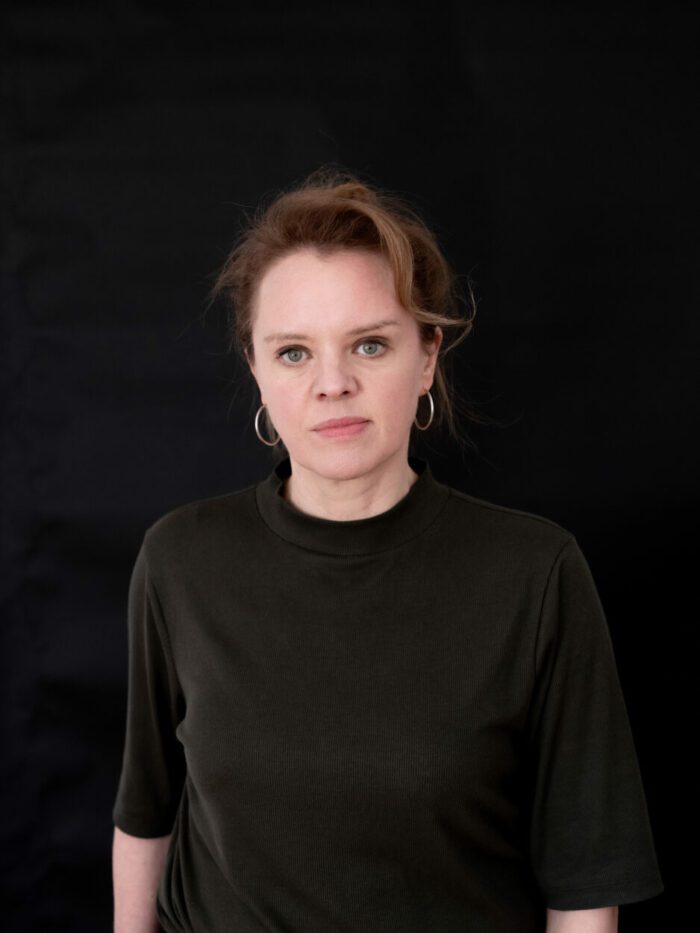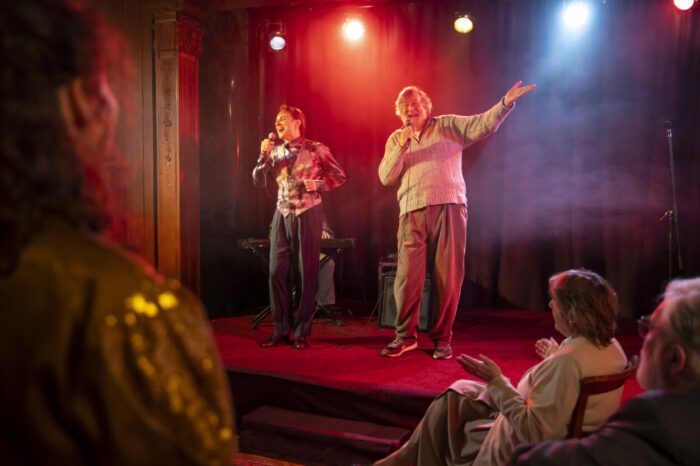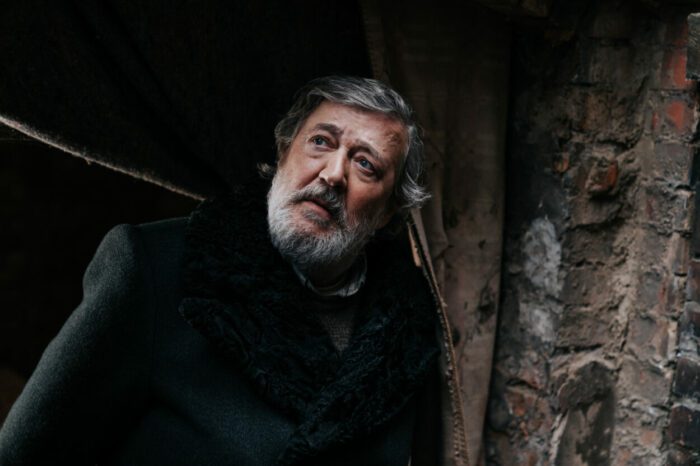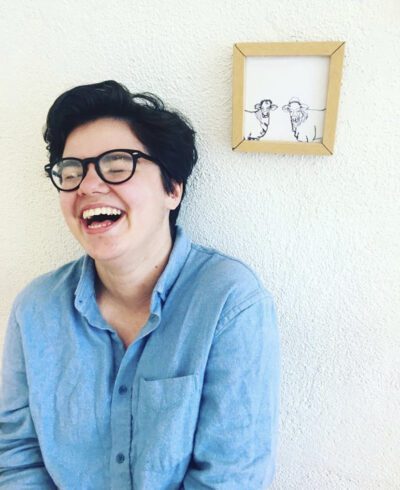Writer and director Julia von Heinz is no stranger to exploring the societal ripples left behind from World War II. Her newest film, Treasure, is the final installment in her “Aftermath Trilogy” about the ways the world has irrevocably changed since the 1940s. In Treasure, von Heinz looks at the generational trauma that exists between Holocaust survivors and their children as well as the echoes that can still be heard today.
Set in 1991, Treasure sees American journalist Ruth (Lena Dunham) traveling to Poland. It’s a journey she’s wanted to take for many years so that she can better understand her family. Accompanying Ruth is Edek (Stephen Fry), her father and a Holocaust survivor. This trip is his first time coming back to Poland after leaving for America after the war and he doesn’t fully understand why his daughter wants to take a trip to a place that caused him so much trauma.

von Heinz sat down with Film Obsessive’s Tina Kakadelis to discuss Treasure, transgenerational trauma, and the power of objects.
(This transcript has been edited for length and clarity.)
Film Obsessive: For my first question, I wanted to start off with the history of this movie. I read that you’ve been trying to make it for ten years. So where did you originally come across this story? Then, is the film that you imagined ten years ago what we get to see today?
Julia von Heinz: I came across the novel [Too Many Men] in the late ’90s, after Lily [Brett] had published it and after it was translated to German. I had read other books of hers before, but this one, I kept it in my mind. I kept the book on my shelf and reread it again and again. It was in 2013 that I thought, why not try? I contacted Lily on Facebook, introduced myself, and asked for the film rights. She answered me three days later and we met and we became friends. I was so lucky. I didn’t imagine it then how it is now. It took many years to get me into a position where I would be a filmmaker and someone like Lena Dunham or Stephen Fry would read a script from from me. That took some years. I could dream of that, but could not realistically believe in it for a long time.
When you first started writing, did the script have that same balance of humor and somber that it does now? Did the script change in those ten years?
I went through many, many drafts. It’s a 600 page novel or 700 even. We had to lose a lot of characters, a lot of side plots. All of that taught to focus on the core of the father/daughter love story, the five days journey, the inner journey that they both do. We always tried to keep that balance because Lily has that beautiful balance in her book. We try to keep that through all the many, many drafts that we wrote. It was important for me to find actors who also understand the comedy. When you see them on the poster, you might right away think, oh, this could be entertaining. That’s what I think when I hear those names. I don’t think it could be boring with the two.

Definitely. Do you think that that assumption kind of works in your favor? Using two very recognizable comedy actors to then give audiences this story of what we can learn about our past and how we can take that to the future.
Very much so. I mean, they both have a deep personal connection to the story. Steven because he did the travel himself. He explored his own roots, his eastern European Jewish family. I saw him being so emotional about it. Lena’s great grandparents come from Poland and she lost family members in the Holocaust. I feel that they very much represent both the comedy side and the deep emotional drama in the film. And because I attend all the screenings at the moment, I can see that it works. I hear a lot of laughter, but there’s also a lot of crying in the in the cinemas. Especially for people in their 60s who are now the age that Ruth would be. They 100% seem to identify with her. It’s a very beautiful experience for me.
Language is something that’s used so purposefully in the film because of how the people communicate among each other. I was wondering if you could talk a little bit about when you decided to switch languages in the script, and then what role you feel language has in the connection between the two generations.
We learn in the film that Edek refused to speak Polish with his child, but spoke his not so well English with her, and so did the mother. That’s what many Jews did when they came to the new countries. They refused to speak their old languages like Yiddish, Polish, German. They tried to to start from scratch. Ruth suffers from it, of course. Yeah. So we didn’t have subtitles for her in the beginning because she just understands nothing. All this Polish is around her, but she just doesn’t understand it. For Edek we have all the subtitles because he’s comfortable in all the languages. He speaks Polish, but very often also speaks English because he wants to come back to Poland as an American. As someone who made it. It was quite careful which language and which subtitle were used and when. It’s not random at all.
In another interview that I read where you were talking about Treasure, you mention the “silence between generations.” I thought that was a really beautiful way of summarizing the film. I was curious if that was a theme that was with you from the original book, or if it developed as the story developed.
I think it’s the Gen Z that helped my generation, Generation X, to understand what transgenerational trauma is. It’s the Gen Z who went to therapy, had all the words, all of that. I learned so much with my daughter who confronted me so brilliantly with everything that I might have done wrong as a mother. She’s so good at that. Lily didn’t know about transgenerational trauma when she wrote the book and it was just not a term that was used. It’s good that we made this film now that we have the word and we know that pain travels through generations and family until someone is ready to feel it. This is for every trauma in every family, not just Holocaust connected. It’s not only a Jewish experience.

The sound design when Stephen Fry’s character, Edek, is looking around Auschwitz was so striking and so haunting because it’s the audience’s only glimpse of the past in a way. You used no historical footage and no photographs, which are fairly common in these Holocaust stories. How did you make that decision to play things just in the present tense?
I feel there are not enough stories about the second generation. The ’90s, for me, feels like it was just yesterday. Which isn’t it’s again, it’s 30 years ago, but we don’t look to that era as a time that we make films of. I wanted to be very precise about 1991. It was an important time in the world when the wall came down and the socialistic countries broke down. Jews from America could finally travel there and explore their roots. Many, many did that in those years. So I thought, this is a time worth telling and being very precise. We had a beautiful Polish team, especially the art directors who had lived through that time and knew everything about it so we could recreate it quite precisely.
My family is Polish and it was really cool to see this version of Poland. Going along with the idea of family, one of Ruth’s main concerns is buying back artifacts from her father’s childhood. I was curious if there’s an item of your own childhood, of your own upbringing that is something that you hold very dear to you.
Oh, let me think. Maybe not really one, but I totally believe in items. For example, I’m wearing this red ribbon which Ruth wears throughout the whole film, maybe you even recognize it. And I feel I can’t let it go before I know my film is safe, my film survives, and that my film can walk without me. I’m totally connected to items and, I even sleep with it. I’ll probably keep it for the next year.
I love that. I hope that ribbon lasts the year! That would be a strong ribbon. Thank you so much for your time today, Julie.


![[L-R] Annabella Sciorra, Odessa A’zion, Jennifer Esposito, Emily Bader as Christine, Connie, Francine, and Rose in Fresh Kills (2023). Courtesy of Quiver Distribution. The Larusso ladies and Aunt Christine sitting at the wedding table wearing red bride's maid dresses.](https://filmobsessive.com/wp-content/uploads/2024/06/XT3S0202-200x133.jpg)
